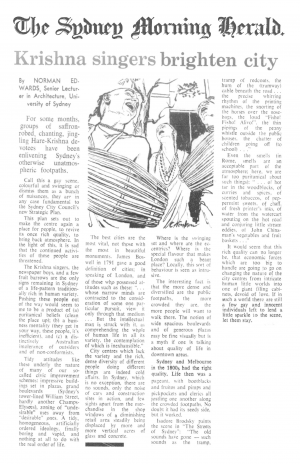Krishna singers brighten city
This article, "Krishna singers brighten city" was published in The Sydney Morning Herald, November 13, 1972, in Sydney, Australia.
By NORMAN EDWARDS, Senior Lecturer in Architecture, University of Sydney
For some months, groups of saffron-robed, chanting, jingling Hare-Krishna devotees have been enlivening Sydney's otherwise unatmospheric footpaths.
Call this a gay scene, colorful and swinging or dismiss them as a bunch of nuisances, they are in any case fundamental to the Sydney City Council's new Strategic Plan.
This plan sets out to make the center again a place for people, to revive its once rich quality, to bring back atmosphere. In the light of this, it is sad that the continued activities of these people are threatened.
The Krishna singers, the newspaper boys, and a few fruit barrows are the only signs remaining in Sydney of a life-pattern traditionally rich in human variety. Pushing these people out of the way would seem to me to be a product of (a) puritanical beliefs (clean the place up); (b) a business mentality (they get in your way, these people, it's inefficient), and (c) a distinctively Australian intolerance of outsiders and of non-conformists.
Tidy attitudes like these underly the nature of many of our so-called civic improvement schemes: impressive buildings set in plazas, grand boulevards (Sydney's tower-lined William Street, hardly another Champs-Elysees), zoning of "undesirable" uses away from "desirable" ones. A tidy, homogeneous, artificially ordered ideology, finally boring and vapid, and nothing at all to do with the real order of life.
The best cities are the most vital, not those with the most in beautiful monuments. James Boswell in 1791 gave a good definition of cities; in speaking of London, and of those whp possessed attitudes such as these: "... whose narrow minds are contracted to the consideration of some one particular pursuit, view it only through that medium ... But the intellectual man is struck with it, as comprehending the whole of human life in all its variety, the contemplation of which is inexhaustible."
City centres which lack the variety and the rich, dense diversity of different people doing different things are indeed cold affairs. In Sydney, which is no exception, there are no sounds, only the noise of cars and construction sites in action, and few sights apart from the merchandise in the shop windows of a diminishing retail area steadily being displaced by more and more vertical acres of glass and concrete.
Where is the swinging set and where are the eccentrics? Where is the special flavour that makes London such a beaut place? Locally, this sort of behaviour is seen as intrusive.
The interesting fact is that the more dense and diversified are the public footpaths, the more crowded they are, the more people will want to walk there. The notion of wide spacious boulevards and of generous plazas may be fine visually but is a myth if one is talking about quality of life in downtown areas.
Sydney and Melbourne in the 1800s had the right quality. Life then was a pageant, with bootblacks and fruitos and pimps and pickpockets and clerics all jostling one another along the crowded footpaths. No doubt it had its seedy side, but it worked.
Isadore Brodsky paints the scene in "The Streets of Sydney": "The old sounds have gone - such sounds as the tramp, tramp of redcoats, the hum of the (tramway) cable beneath the road ... the precise whirring rhythm of the printing machines, the snorting of the horses over the nosebags, the loud 'Fisho! Fisho! Alivo!', the thin pipings of the penny whistle outside the public houses, the chatter of children going off (to school)..."
Even the smells (in Rome, smells are an acceptable part of the atmosphere; here, we are far too puritanical about such things): "... of hot tar in the woodblock, of curries and spices, of scented tobaccos, of peppermint sweets, of chaff, of fresh printer's inks, of water from the watercart spouting on the hot road and conjuring little stream eddies, of John Chinaman's vegetables and fruit baskets ..."
It would seem that this rich quality can no longer be, that economic forces which are too big to handle are going to go on changing the nature of the city centres from intricate human little worlds into one of giant filing cabinets, devoid of love. If in such a world there are still a few gay and innocent individuals left to lend a little sparkle to the scene, let them stay.
